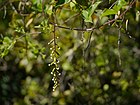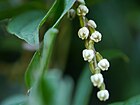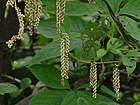Note: This is a project under development. The articles on this wiki are just being initiated and broadly incomplete. You can Help creating new pages.
Difference between revisions of "Dioscorea pentaphylla - Mountain yam"
(→Common names) |
(→How to plant/cultivate) |
||
| (5 intermediate revisions by the same user not shown) | |||
| Line 8: | Line 8: | ||
==Chemical Composition== | ==Chemical Composition== | ||
| − | <ref name="chemical composition"/> | + | It contains the following constituents Phenols/Polyphenols, Flavonoids, Terpenoids, Tannins, Alkaloids and Saponins. Phenols and Saponins were invariably present in all the solvent extracts.<ref name="chemical composition"/> |
==Common names== | ==Common names== | ||
| Line 51: | Line 51: | ||
==How to plant/cultivate== | ==How to plant/cultivate== | ||
| − | <ref name="How to plant/cultivate"/> | + | Plants grow best in lowland tropical areas with a temperature around 26 - 34°c; A well-defined dry season of 2 - 5 months and a total rainfall of 1,300 - 1,700mm evenly distributed throughout the remainder of the year. For best yields, this species requires a deep, well-drained, sandy loam that is not liable to water-logging.<ref name="How to plant/cultivate"/> |
==Commonly seen growing in areas== | ==Commonly seen growing in areas== | ||
| Line 67: | Line 67: | ||
==References== | ==References== | ||
<references> | <references> | ||
| − | <ref name="chemical composition"> | + | <ref name="chemical composition">Journal Paper National Library of Medicine - Bio-efficacy of Dioscorea pentaphylla from Midmid-Western Ghats, India</ref> |
<ref name="Leaf">[Morphology]</ref> | <ref name="Leaf">[Morphology]</ref> | ||
| − | <ref name="Common names"> | + | <ref name="Common names">Information from Flowers of India article</ref> |
| − | <ref name="How to plant/cultivate"> | + | <ref name="How to plant/cultivate">Tropical The Ferns Information about Cultivation</ref> |
<ref name="Karnataka Medicinal Plants">”Karnataka Medicinal Plants Volume-3” by Dr.M. R. Gurudeva, Page No.275, Published by Divyachandra Prakashana, #6/7, Kaalika Soudha, Balepete cross, Bengaluru</ref> | <ref name="Karnataka Medicinal Plants">”Karnataka Medicinal Plants Volume-3” by Dr.M. R. Gurudeva, Page No.275, Published by Divyachandra Prakashana, #6/7, Kaalika Soudha, Balepete cross, Bengaluru</ref> | ||
</references> | </references> | ||
Latest revision as of 09:03, 3 September 2023
Dioscorea pentaphylla is a perennial climbing plant producing annual stems from a perennial rootstock. These stems scramble over the ground or twine into the surrounding vegetation. The plant is widely cultivated in tropical areas of Asia for its edible root. It is also harvested from the wild because its slender tubers render its cultivation more difficult.
Contents
- 1 Uses
- 2 Parts Used
- 3 Chemical Composition
- 4 Common names
- 5 Properties
- 6 Habit
- 7 Identification
- 8 List of Ayurvedic medicine in which the herb is used
- 9 Where to get the saplings
- 10 Mode of Propagation
- 11 How to plant/cultivate
- 12 Commonly seen growing in areas
- 13 Photo Gallery
- 14 References
- 15 External Links
Uses
Piles, Dysentery, Inflammation[1].
Parts Used
Chemical Composition
It contains the following constituents Phenols/Polyphenols, Flavonoids, Terpenoids, Tannins, Alkaloids and Saponins. Phenols and Saponins were invariably present in all the solvent extracts.[2]
Common names
| Language | Common name |
|---|---|
| Kannada | ಕಾಡು ಗುಂಬಳ Kaadu gumbala |
| Hindi | Kanta alu, Phal alu |
| Malayalam | Kattukizhangu, Marakkizhangu |
| Tamil | Kattu-valli, Nurai |
| Telugu | Adavi ginusu tiga, Adavi gummadi tiga |
| Marathi | Gaaboli, Mundavalya |
| Gujarathi | Nano jungli kand, Vajnu kand |
| Punjabi | NA |
| Kashmiri | NA |
| Sanskrit | Kantakaluka |
| English | Mountain yam, Five Leaf Yam |
Properties
Reference: Dravya - Substance, Rasa - Taste, Guna - Qualities, Veerya - Potency, Vipaka - Post-digesion effect, Karma - Pharmacological activity, Prabhava - Therepeutics.
Dravya
Rasa
Guna
Veerya
Vipaka
Karma
Prabhava
Habit
Identification
Leaf
| Kind | Shape | Feature |
|---|---|---|
Flower
| Type | Size | Color and composition | Stamen | More information |
|---|---|---|---|---|
| Flowering season from July to December |
Fruit
| Type | Size | Mass | Appearance | Seeds | More information |
|---|---|---|---|---|---|
| Fruiting season from July to December |
Other features
List of Ayurvedic medicine in which the herb is used
Where to get the saplings
Mode of Propagation
How to plant/cultivate
Plants grow best in lowland tropical areas with a temperature around 26 - 34°c; A well-defined dry season of 2 - 5 months and a total rainfall of 1,300 - 1,700mm evenly distributed throughout the remainder of the year. For best yields, this species requires a deep, well-drained, sandy loam that is not liable to water-logging.[5]
Commonly seen growing in areas
Scrub forests, Forest margins.
Photo Gallery
References
- ↑ 1.0 1.1 ”Karnataka Medicinal Plants Volume-3” by Dr.M. R. Gurudeva, Page No.275, Published by Divyachandra Prakashana, #6/7, Kaalika Soudha, Balepete cross, Bengaluru
- ↑ Journal Paper National Library of Medicine - Bio-efficacy of Dioscorea pentaphylla from Midmid-Western Ghats, India
- ↑ Information from Flowers of India article
- ↑ [Morphology]
- ↑ Tropical The Ferns Information about Cultivation
External Links
- Ayurvedic Herbs known to be helpful to treat Piles
- Ayurvedic Herbs known to be helpful to treat Dysentery
- Ayurvedic Herbs known to be helpful to treat Inflammation
- Herbs with Root used in medicine
- Herbs with Leaf used in medicine
- Herbs with Whole Plant used in medicine
- Herbs with common name in Kannada
- Herbs with common name in Hindi
- Herbs with common name in Malayalam
- Herbs with common name in Tamil
- Herbs with common name in Telugu
- Herbs with common name in Marathi
- Herbs with common name in Gujarathi
- Herbs with common name in Sanskrit
- Herbs with common name in English
- Habit - Perennial climber
- Index of Plants which can be propagated by Seeds
- Index of Plants which can be propagated by Cuttings of tubers
- Herbs that are commonly seen in the region of Scrub forests
- Herbs that are commonly seen in the region of Forest margins
- Herbs
- Pages without herbs images





